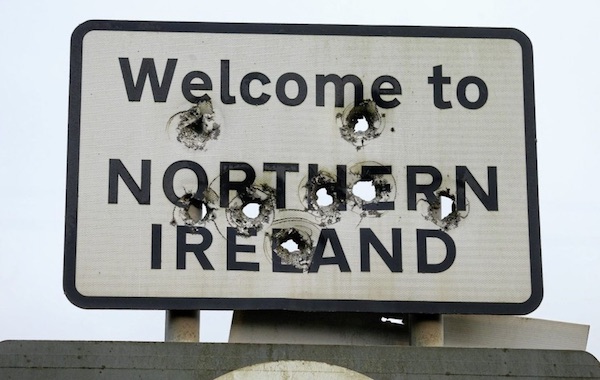
As a draft deal on Britain’s withdrawal from the European Union was being parsed today, unionists appeared to have won dramatic changes, heavily eroding a previous commitment to no regulatory divergence along the Irish border and adding clear guarantees of no regulatory barriers between the north of Ireland and Britain.
All sides involved in the talks spoke of having achieved their desired goals. DUP leader Arlene Foster said her party had won “six substantive changes” to the text on the Irish border in overnight talks, ensuring there would be “no red line down the Irish Sea”.
Despite major contradictions in the text, Brussels officials and the governments in Dublin and London proclaimed themselves satisfied with the outcome, which permits negotiations to move forward to the specifics of trade agreements.
DUP spokesman Sammy Wilson said the agreement ensured the north of Ireland would leave the European Union, its customs union and single market “along with the rest of the United Kingdom”, and that there would be no customs or trade barrier between the north of Ireland and Britain.
He also claimed his party had defeated Sinn Fein’s call for designated special status for the north of Ireland, which would not be separated “constitutionally, politically, economically or regulatory from the rest of the United Kingdom”.
The text makes copious references to the “1998 [Good Friday] Agreement” and the principle of consent -- the requirement of a majority of citizens in the Six Counties to support any future constitutional change -- even though voters in the north of Ireland soundly rejected Brexit and, polls indicate, continue to do so.
In another apparent contradiction, Dublin said the final wording of the agreement preserves the promise of “full regulatory alignment” between the North and South of Ireland.
It pointed to a section of the text which declared that in the absence of an overall agreement, “the United Kingdom will maintain full alignment with those rules... which support North-South cooperation, the all-island economy and the protection of the 1998 Agreement.”
However, that statement appears to be a significant dilution of the situation earlier this week. The deal also goes on, in the next paragraph, to spell out the opposite case -- “the United Kingdom will ensure that no new regulatory barriers develop between Northern Ireland and the rest of the United Kingdom unless, consistent with the 1998 Agreement, the Northern Ireland Executive and Assembly agree that distinct arrangements are appropriate for Northern Ireland.”
This appears to provide an extraordinary veto on trade deals to the devolved Stormont Assembly and Executive, which collapsed in January, despite there being no indication that they will return.
The agreement also specifies that a separate strand of the negotiations in phase two will be concerned with Irish issues. It says this work will also address issues arising from “Ireland’s unique geographical situation”, including the transit of Irish goods through Britain and Ireland to markets in mainland Europe.
British Prime Minister May said the deal would ensure “no hard border” in Ireland and added the deal was a “significant improvement”.
A Dublin government spokesman said the negotiations had preserved the Common Travel Area, the Good Friday Agreement “and crucially obtaining a guarantee that there will be no hard border.”
Taoiseach Leo Varadkar has said it was a “significant day” for Ireland.
“We have achieved all that we set out to achieve in phase one of these negotiations,” he told a press conference in Government Buildings in Dublin. “I am satisfied that sufficient progress has now been made on Irish issues, the parameters have now been set and they are good.”
He said Ireland’s focus would now move to phase two of the negotiations. Mr Varadkar said his government would remain “fully engaged and vigilant” throughout the process.
“This is not the end but it is the end of the beginning,” he added.
![[Irish Republican News]](https://republican-news.org/graphics/title_gifs/rn.gif)
![[Irish Republican News]](https://republican-news.org/graphics/title_gifs/harp.gif)

